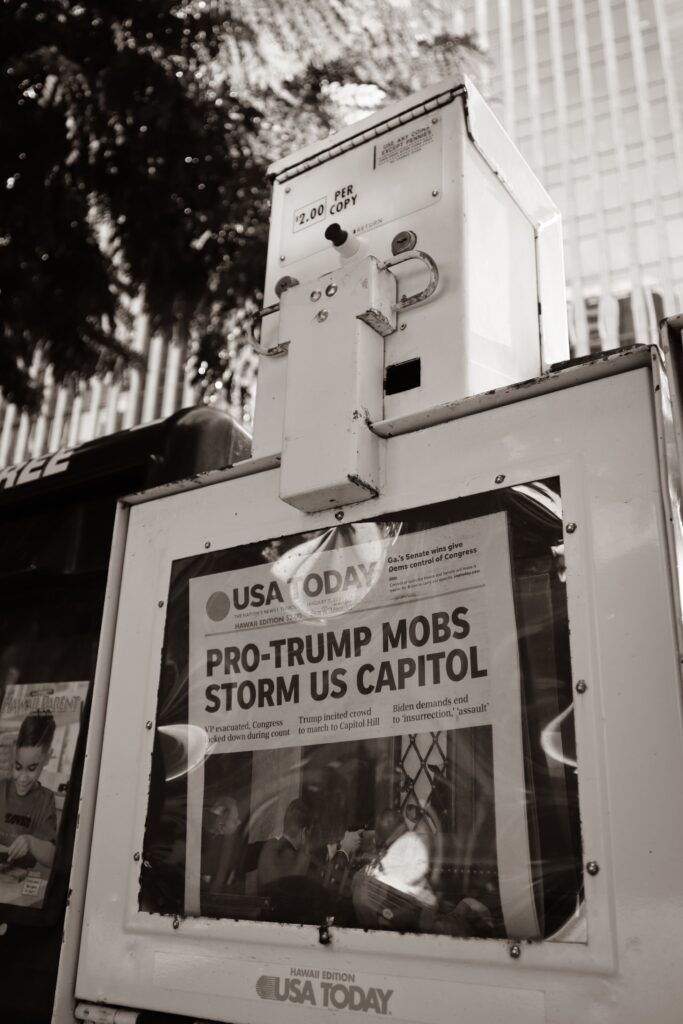By Adam Bennett
“This American carnage stops right here, and it stops right now.”
– President Donald Trump, 19th January 2017
Four years ago this month, Donald Trump became the 45th President of the United States. The campaign had been hard-fought, with its result shocking observers from virtually every corner of the globe. It seemed that nobody knew quite what was going to come next – only that it was going to be dramatic.
1,460 days later, the world witnessed him depart. Not at a formal inauguration ceremony, symbolically handing power to his successor Joe Biden. But rather at his own event, soundtracked by a military band and surrounded by family members – some of whom had served as government officials over the course of his administration. It was unprecedented, controversial, and loud. Perhaps, then, it was the perfect sendoff for his presidency.
It feels as though January 2021 has seen the past four political years in the US culminate in a finale equal measures breathless, chaotic, and conclusive. From shock results in Georgia to the inauguration of Joe Biden and Kamala Harris, The International is unpicking the story of one of political history’s most defining months.
January 5th – Democrats Win Big In Georgia
“I learned long ago that winning doesn’t always mean you get the prize. Sometimes you get progress, and that counts.”
That quote from the influential politician and strategist Stacey Abrams came in June 2020, ahead of an unprecedentedly bitter and grueling election campaign. That campaign culminated on the 5th of January 2021, as voters in the state of Georgia elected Democrats Raphael Warnock and John Osoff, rubber-stamping President-Elect Joe Biden’s shock win in the state in November. Changing demographics appeared to explain the traditionally Republican state’s shift to the left.
For Abrams and Biden, the results were momentous and significant in equal measure – but for different reasons. Joe Biden will have celebrated knowing that his Democratic party controls both the House of Representatives and now the Senate, meaning his ambitious legislative agenda stands the best possible chance of becoming a reality.
For Abrams, on the other hand, the results represent a dramatic vindication for her work in the state over the past era of American politics. In 2018, Abrams lost the governorship of Georgia in controversial circumstances to Republican Brian Kemp. It seemed then that Trump’s party still had an iron grip on the state. But just over two long years later, Abrams’ work in organising Democrats in Georgia has resulted in a dramatic and significant victory for her party.
January 6th – American Carnage At The Capitol
“Because you’ll never take back our country with weakness. You have to show strength, and you have to be strong.“
The crowd was chanting Donald Trump‘s name long before he spoke those words.
Ever since the election of last November, the outgoing president had refused to formally acknowledge victory for the Democrats and Joe Biden. Instead, Trump has sought to prove his claim that the vote was in fact ‘stolen’, with his lawyer – former New York City mayor Rudy Giuliani – presenting evidence to various courts over the course of two months. In spite of his legal team’s failure to provide sufficient evidence to back up Trump’s grandiose claims of conspiracy, the president held a Washington rally for his supporters on the 6th January.
What happened directly after, however, would shock the world. The Capitol building, long an iconic symbol for democracy, was stormed by a group of Pro-Trump rioters. Hoising ‘TRUMP/PENCE 2020’ banners and – more alarmingly – civil-war era confederate flags, the rioters were able to breach security measures and vandalise the interior of the building. As the planet watched open-jawed for hours, Trump finally issued a message to his supporters to stand down. Controversially, the president remarked that the rioters were ‘very special, and we love you’.

While You’re Here…
Why not take a moment to subscribe to The International’s free monthly newsletter? It takes seconds to sign up, and you’ll stay up to date with the stories shaping our world at a pace that won’t overwhelm.
January 9th – Trump Loses Twitter
“…we have permanently suspended the account due to the risk of further incitement of violence.”
Over the course of his presidency, Donald Trump maintained a clear preference for the social media app Twitter. The last four years saw Trump declare policy, target rivals, and offer praise for allies on the platform. Following an official statement from Twitter on the 9th of January, however, the president’s account was permanently suspended.
The platform had already spent months taking the unprecedented step of adding fact-check notices to Trump’s tweets in light of November’s election. Riots at the Capitol – and the president’s response to them – proved the final straw, however, as an ‘incitement to violence’ was cited as the reasoning behind his permanent suspension.
Right-wing social media site Parler has so far been a beneficiary of the decision, as conservatives bemoaning a lack of ‘free speech’ flocked to the platform as an alternative to Twitter. The implications for the wider political conversation – both in the US and abroad – remain to be seen.
January 13th – Trump’s Second Impeachment
“Donald Trump is a clear and present danger to our country.”
Addressing the House of Representatives, speaker Nancy Pelosi outlined the case for impeaching Donald Trump. The article – which passed after 10 Republicans broke ranks to vote against Trump – makes history as the first time a president has been impeached twice.
Following news that the Capitol riots had resulted in the deaths of five people, incoming president Joe Biden said that the decision represented “a bipartisan vote cast by members who followed the constitution and their conscience”.
With the article of impeachment now sent to the Senate, the upcoming trial will potentially have profound consequences for Donald Trump. Should he lose the trial, he will be unable to run again for the White House in 2024 – a move many close to Trump suggests could become reality. Additionally, the former president could stand to lose many of the financial benefits afforded to outgoing premiers should he lose the trial.
The trial in the Senate will begin during the week commencing 8th February.

20th January – Biden And Harris Inaugurated
“We’ve learned again that democracy is precious, democracy is fragile, and at this hour, my friends, democracy has prevailed.”
Given the violence at the Capitol just days previously, tensions were running high leading up to president Joe Biden and vice president Kamala Harris’ inauguration. In truth, the Covid pandemic was not the only reason Washington was placed in near-total lockdown for the week leading up to the event.
Whereas the event would normally have been attended by a crowd of thousands, the US’ 46th president was inaugurated in front of little more than a few TV cameras and American flags where supporters and spectators would previously have stood.
Also making history was Kamala Harris, who became the US’ first African-American vice president, first Asian-American vice president, and the highest-ranking female elected official in American political history.
Despite the worst fears of observers, the event passed without any notable security incidents. Instead, the world watched as Biden called for unity and healing in a markedly more traditional ceremony than that which took place four years previously.
22nd January – The New Agenda
“We have the tools to help people. So let’s use the tools, all of them. Use them now.”
At the time of writing, Joe Biden has introduced no fewer than 30 executive orders – the most of any incoming president in history over the same time period.
Perhaps most eye-catchingly, Biden has moved swiftly to reverse totemic Trump policies such as the border wall with Mexico, and the ban on passport holders from Muslim-majority countries entering the United States.
Elsewhere, however, the new president has signed into law a series of orders aimed at fighting against the Coronavirus pandemic. These measures have included creating economic relief for workers and families, establishing a Pandemic Testing Board to expand the country’s testing facilities, and the creation of a Covid-19 Response Coordinator responding directly to Biden himself.
Whilst these initial orders seem set to fight against the immediate crises at the country’s front door, Biden’s assertiveness in implementing his agenda could provide a clue as to how he is expected to govern in the long-term. Whilst a ‘green new deal’ and other such ambitious legislation may seem a long way off, the Democrats are in a historically powerful position from which to set America’s agenda.
Just how far that power can be put to work is, ultimately, a question that will take another 1,460 days to answer.
Adam Bennett is the editor-in-chief of The International. You can find him on Twitter here.
